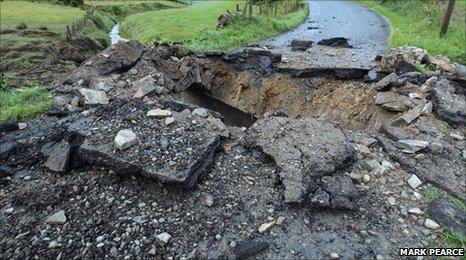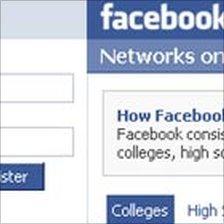How social media points the way forward for journalism
- Published

The bomb in south Armagh caused extensive damage
When a bomb exploded in south Armagh last Saturday, Facebook, Twitter and similar websites buzzed with updates on what had happened from those living close to the scene. Journalist Paul Rocks looks at how social media is impacting on how and when news is reported.
When a newsroom gets a call about an incident, what usually follows is a process aimed at putting together a complete picture of what has happened.
This normally starts with the Kipling procedures of what, where, when, why, who, how and entails countless calls to the police press office and contacts living near the area to get whatever small titbits of information you can find.
But when a bomb exploded in south Armagh on Saturday, I saw a scenario play out on the social networking site Facebook that took the newsgathering process to a completely new level.
The device was detonated on a country road at 1730 BST, blowing a crater in the road and damaging a stone bridge. The police believe it was an attempt by dissident republicans to kill its officers.
Shook
From what followed on Facebook it was clear that it was heard for miles around.
Within minutes of the blast my niece posted: "Did anyone hear a bomb?"
It was like the jungle drums had sounded all across south Armagh with replies from Bessbrook to Cullyhanna in seconds.
"It was really loud - my whole house shook," said Natasha.
"People in Silverbridge heard it, so it might be in Newtown(hamilton)," replied Laura.
Seconds later a worried Tanya posted: "It must be near me because it sounded really loud."
Within just 20 minutes, Stacey wrote: "Bomb was on the Carrickrovaddy Road - they blew a bridge up." Which is exactly what happened.
At this stage I thought I had better put a call in to a journalist colleague who was on duty and let him know what was happening.
The police press office had no details of the incident, which was not surprising as they would not have had time to even get to the scene by that point.
Waiting for news

Facebook is having an impact on journalists work
The events of August 15th 1998 put this into perspective. I was on duty in the BBC's Belfast newsroom when we had a call from a County Tyrone councillor saying he had heard an explosion in the Omagh area.
We tried the police press office but got very little in terms of detail. We then tried the local hospital and could not get through. The next stage was to call around other local representatives and contacts. They had heard an explosion but had nothing further to add.
A bomb had ripped through the centre of the market town, killing 29 people and injuring hundreds more but it was two hours later before we had any idea of the scale of what had happened.
These days, journalists are regularly making use of social networking sites to find people for their news reports - especially for television. This procedure used to involve lots of time and phone calls to find the right person and it could be quite frustrating.
A friend of mine recently did a feature on changes to the UK driving test and needed to find someone who had recently taken the examination.
Shortly after posting this request on Facebook, he had an inbox full of messages from friends saying they knew someone who would fit the bill.
It makes sense. With one phone call you can ask one person a question. With on click on a social networking site, you can ask hundreds of people.
Tweet
Later on Saturday, South Armagh MLA Dominic Bradley posted comments about the explosion on Twitter and Facebook, taking the process full circle from breaking news to reaction.
He is just one of many Northern Ireland politicians using social networking to deliver their message.
There is a word of caution that goes with trusting what we read on this great "word of mouth" network.
Recent rumour mill stories on Facebook on the private lives of footballers ended up in the press and were proven to be totally wrong.
So while this new technology can speed up the newsgathering process, journalists will need to make sure they do what they have always done - double check the facts.
- Published11 July 2010